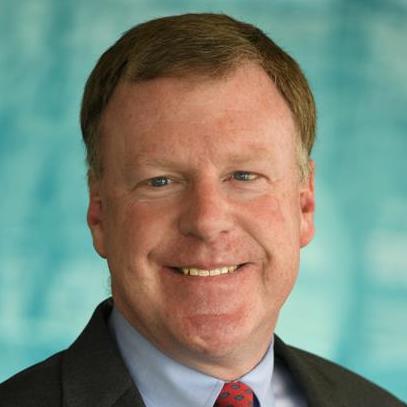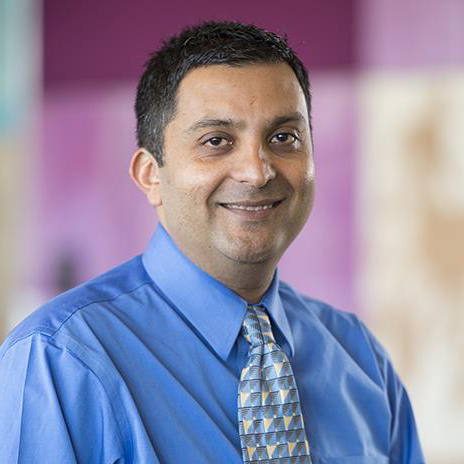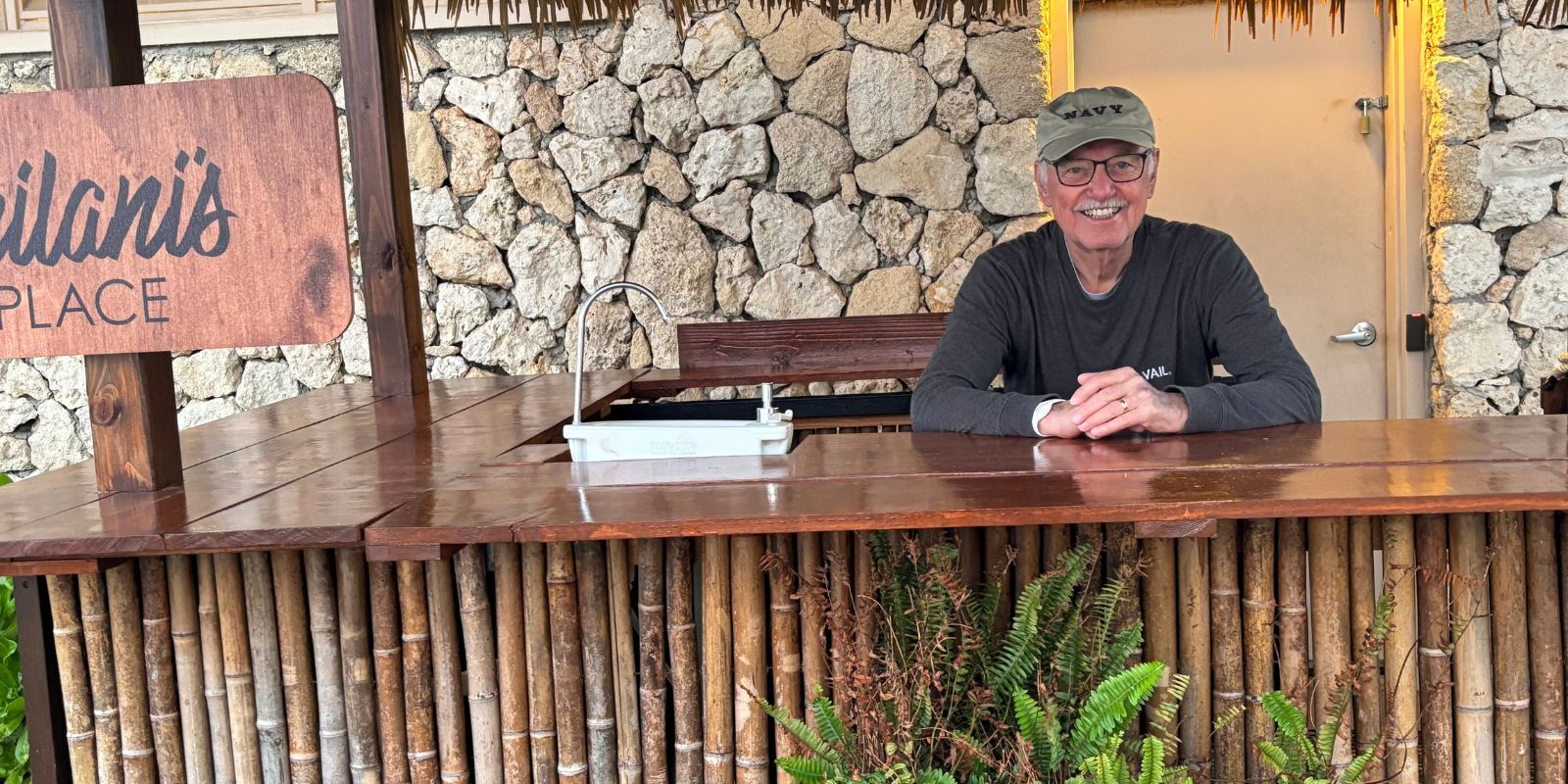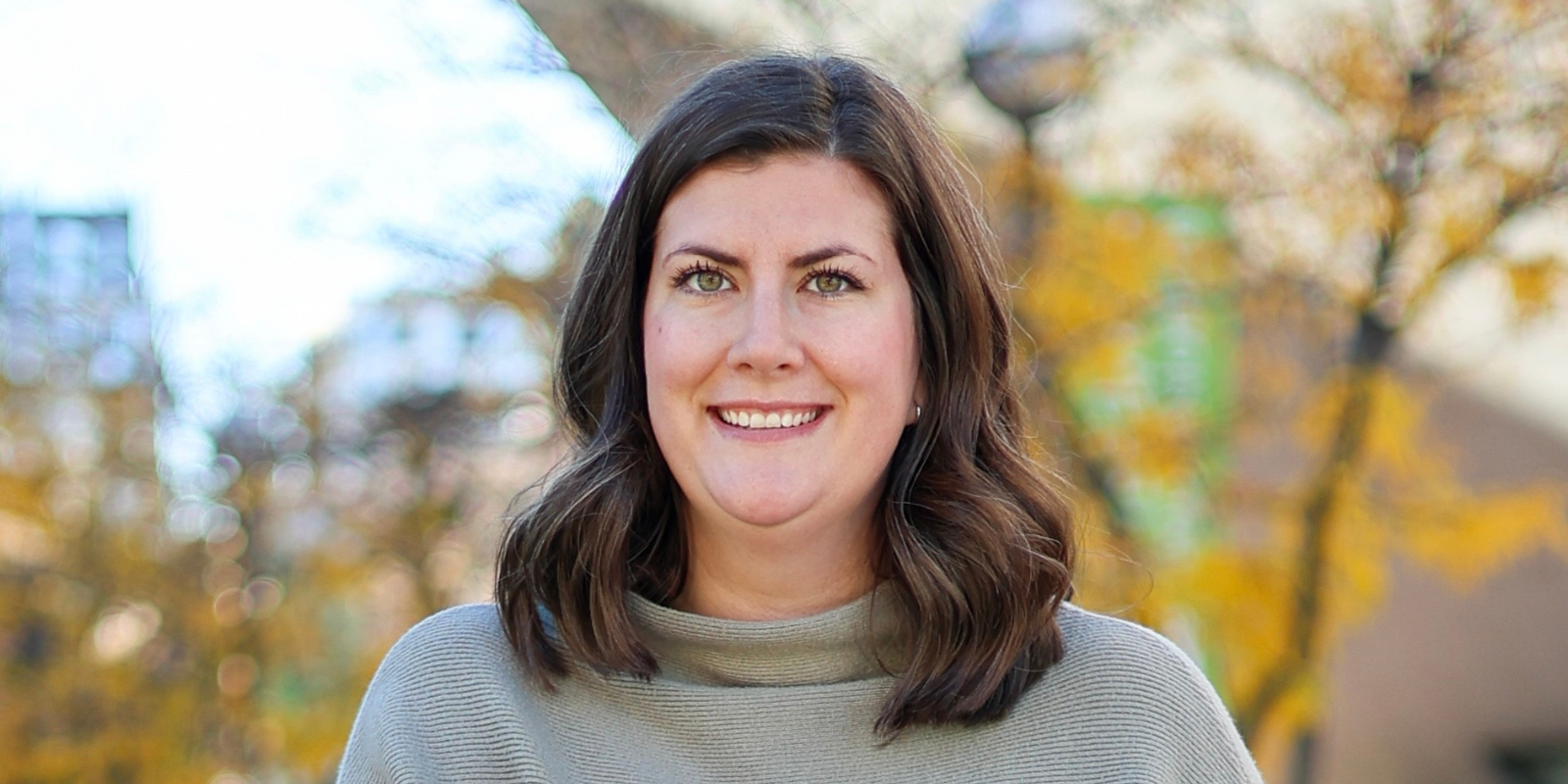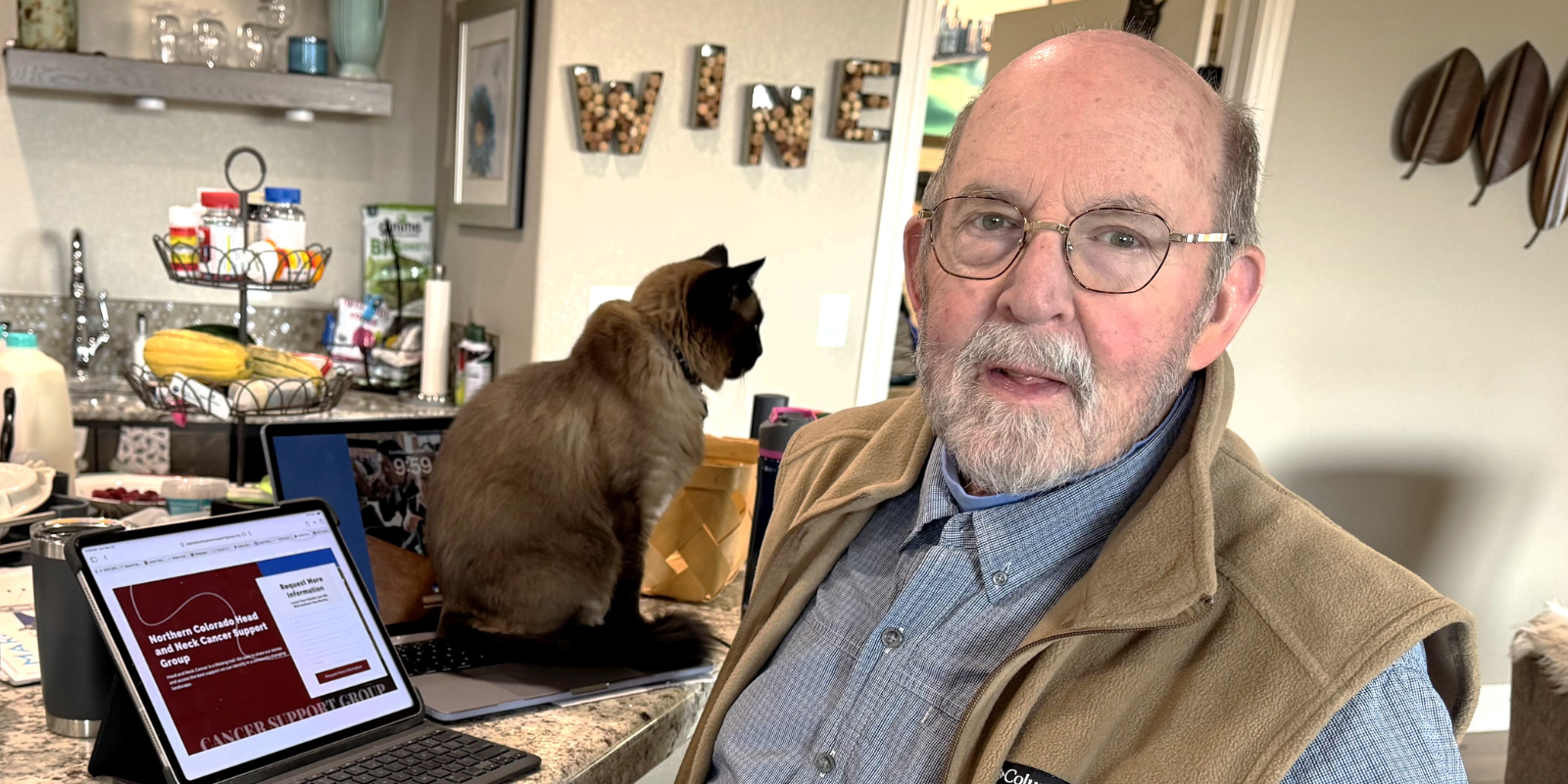Look at the racing jersey created in his memory, and you’ll see images of everything Trevor Kling loved. Bright colors. Baseball. Pineapple. Bowling. Sports cars. Board games.
When the Wheels of Justice cycling team takes to the Colorado mountains July 15 and 16 for the annual Courage Classic ride, the parade of brightly colored jerseys — rising and falling as the riders crest hills and soar to the bottoms of valleys — will serve as a tribute in neon to the boy, once full of silliness and smiles and energy, who died in 2017, at age 14, from anaplastic astrocytoma. It’s a common brain tumor in adults, but one that is rarer in children. When he was first diagnosed, Trevor was given a 5%-10% chance of survival.
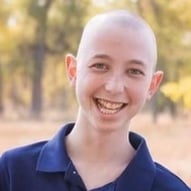 2023 Wheels of Justice honoree Trevor Kling.
2023 Wheels of Justice honoree Trevor Kling.
“I have a photo of Trevor in my office from when he was in clinic one day, and he’s smiling in it,” says University of Colorado Cancer Center member Rajeev Vibhakar, MD, PhD, a pediatric oncologist at Children’s Hospital Colorado, who treated Trevor. “He was always smiling, even on days that I knew he had to be feeling bad because of the chemo he had just gotten or because the tumor had increased again. He always had a positive outlook.”
Riding for research
That positivity is one of the reasons Trevor was chosen by the Wheels of Justice team as this year’s honoree. The team, which rides every summer to raise money for cancer research and support at Children’s Colorado, each year rides in memory of a cancer patient who died from the disease.
Founded 18 years ago by a group of attorneys (hence the name) who wanted to give back to the community, the Wheels of Justice team gathers every summer to take part in the Courage Classic, a fundraising bike ride for Children’s Hospital Colorado as a whole.
The Wheels of Justice team, made up of patients, families, caregivers, and members of the community who have been directly affected by cancer, specifically raises money for the Center for Cancer and Blood Disorders at Children’s Colorado, including fellows who conduct research and the center’s Wellness Program for cancer patients and their families. The doctors and researchers who provide care and breakthroughs for the Center for Cancer and Blood Disorders are CU Cancer Center members.
A cancer journey begins
The Courage Classic is especially meaningful for parents like David Kling, Trevor’s father, who sees the annual event in part as an occasion to talk with other families whose children are sick or have died.
“It’s an opportunity to talk openly about different things that most other families can’t handle without hurting someone’s feelings or freaking them out,” he says. “It’s also a great weekend to get out and enjoy the mountains and tell stories about our kids. And it means even more this year because we are wearing a jersey that says ‘Trevor’ on it.”
Riding in the Courage Classic is also a time for Kling to look back on Trevor’s cancer journey, which began in 2015 when Trevor, a competitive baseball player, started getting migraine headaches and throwing up during games. Doctors attributed the symptoms first to dehydration, then a concussion, since Trevor played catcher and was frequently run into by other players.
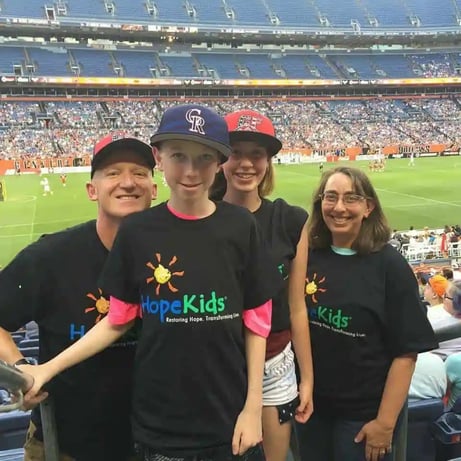 Trevor and his family.
Trevor and his family.
“His personal physician said, ‘It must be the concussions. It can’t be cancer, because he only has one sign of cancer. He doesn’t check all the boxes, so we’re not going to test him for brain cancer,’” Kling says. “I hate to say it, but that’s a story I’ve heard from many families I have met over the years.”
Then came the morning when Trevor was eating breakfast and looked over at his mother with cereal falling out of his mouth. “I forgot how to chew,” he told her.
Trevor’s parents took him immediately to Children’s Hospital Colorado, where an MRI revealed a fist-sized tumor in his brain. A biopsy revealed that the tumor was anaplastic astrocytoma, and surgery was scheduled, followed by chemotherapy and radiation to kill any remaining cancer cells.
“The tumor was on the right side of his brain, and when he came out of surgery, he had lost 25% of the movement on his left side,” Kling says. “He had to relearn how to walk and use his arm again. And in pictures after that, he could never close his mouth. There’s only half a smile.”
Tragic relapse
After several weeks of treatment, Trevor was declared cancer-free. Four months later, however, at a bowling tournament in Grand Junction, the seizures came back. He and his family returned to Children’s Colorado, where they were told no more treatment options were available. In a matter of weeks to months, Trevor would die from his cancer.
“Unfortunately, brain tumors, particularly high-grade gliomas, are very difficult to treat,” says Vibhakar, professor of pediatric hematology/oncology and bone marrow transplantation at the CU School of Medicine. “We only cure around 25% to 30% of our patients who have that kind of tumor. When you develop good relationships with the families and the patients, like I did with Trevor, it makes it that much harder from an emotional perspective. It makes it easier when you have patients like Trevor, who keep pushing through it and keep facing the challenges. But we do get to a point where I say, ‘OK, I’ve given him a lot of treatments, and we’ve identified that there really is no more treatment available.’ Having that conversation is always hard.”
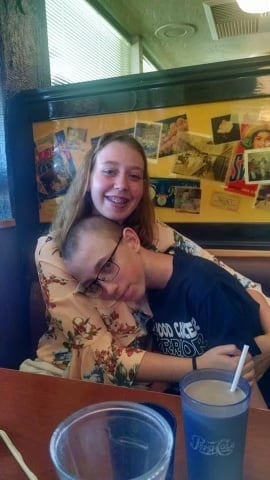 Trevor and his sister, Madeline.
Trevor and his sister, Madeline.
Trevor, however, handled it better than most, Vibhakar says.
“He was really an amazing kid. He was tuned into everything and had a very mature outlook on things,” Vibhakar says. “He knew how he felt, he knew what his emotions were, and he was able to communicate that. When we had that conversation, he was ready for it. He knew it was coming, because of all the challenges he had faced. He processed it well, and because of that he was truly able to maximize the amount of time he had left.”
For Trevor, that included finishing eighth grade and starting high school, going to a high school dance, hanging out with his family and friends, and playing sports as much as he was able. He did all of it, starting high school in August 2017 and attending for several weeks before he entered hospice. The daughter of a family friend who was attending Colorado State University in Fort Collins came down to be Trevor’s date to the homecoming dance.
“He could have done anything he wanted, but that’s what he wanted to do,” Kling says. “And he was able to do it.”
Saying goodbye
For Vibhakar and Robert Casey, PhD, associate professor of pediatric hematology/oncology and bone marrow transplantation and a pediatric psychologist at Children’s Colorado, losing patients like Trevor is a sad reality of the job. But in some cases, the patient’s spirit lives on.
“He died, and that was devastating, but I also can hold on to who he was as a kid,” Casey says. “I can remember what he taught me and what he brought to the situation, and I can look at him and feel so inspired by how strong he was.”
Casey is particularly struck by one of Trevor’s final acts — agreeing to be part of a clinical trial for a new type of chemotherapy even though he knew it wouldn’t help him. He did it, he said, because it might help another kid down the road.
“That was a really good example of who he was and how he was able to think beyond himself,” Casey says. “He was one of those kids who was able to say, ‘OK, this is happening to me. What can I do? How can I help other people? How can I help my family?’ His perspective was pretty incredible.”
Lead photo: David Kling wearing the jersey designed for his son Trevor.

